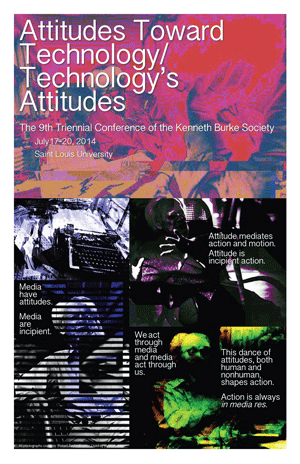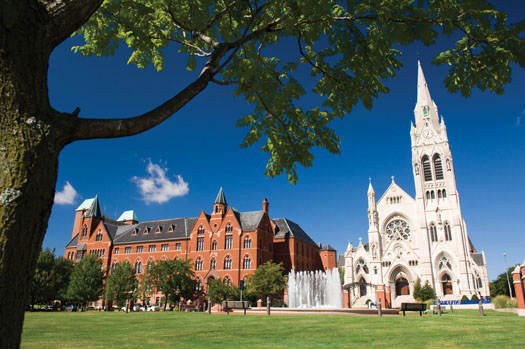
Fast Facts
Conference Dates: July 17-20, 2014
Proposal Deadline: February 14, 2014
Submit Proposal to: kbsconference2014@gmail.com
Acceptance Notification: March 14, 2014
Please note that acceptance notifications went out March 14, 2014. If you haven't heard from us, please email the conference organizers right away.
Registration Window: April 1, 2014 to July 1, 2014. Register Here (Late registration will begin July 2, 2014.)
Conference Website: http://kbjournal.org/kbs14
Conference Chairs: Paul Lynch (plynch11@slu.edu) and Nathaniel Rivers (nrivers1@slu.edu)
Conference Keynotes: Jodie Nicotra will present "Compulsion and 'Transcendence Sideways': Burke’s Technological Attitudes," and Thomas Rickert will present "Making Hope Out of Nothing at All: Amechania in Burke, Nietzsche, and Parmenides." Both talks engage the conference theme of Attitudes Toward Technology/Technology’s Attitudes. Find abstracts here.
Conference Seminars: For a complete list (and descriptions) of seminars click here.
Conference Poster: Click Here. (Poster designed by Nathaniel A. Rivers. Animated gif generated by Chris Lindgren)
Conference Program
Call for Nominations for the 9th Triennial Kenneth Burke Society Awards
KBS 2014: Conference Paper Awards
Conference Theme
Attitude mediates action and motion. Attitude is incipient action. Media have attitudes. Media are incipient. We act through media and media act through us. This dance of attitudes, both human and nonhuman, shapes action. Action is always in media res.
Taking both Burke’s attitude and his rhetorical philosophy of technology as points of departure, The Ninth Triennial Conference of the Kenneth Burke Society welcomes proposals that focus on attitudes toward technology and technology’s own attitudes. We also welcome proposals that focus on any Burkean subject. The conference will be hosted by Saint Louis University in historic Midtown, home of the Grand Center, the place for the arts in St. Louis, from July 17-20, 2014. Saint Louis University is also home to the Walter J. Ong, SJ, Center for Language, Media and Culture as well as the Ong Archives. In the middle of the country, in the middle of the city, we will grapple with being in media res.
In a retrospective to Attitudes Toward History, Burke defines attitude as “the point of personal mediation between the realms of nonsymbolic motion and symbolic action” (394). For Burke, these realms are tightly knitted, and as Debra Hawhee reminds us, we should see them as “an irreducible pair, contiguous but distinct” (Moving Bodies 158). Stuff and story dance in attitudes.
In his reexamination of Burke’s status as a luddite, Ian Hill reminds us that “Burke’s writing was fraught with technological anxiety, and his negative attitude toward technology developed over many decades.” Nevertheless, Hill demonstrates how Burke developed a “rhetorical philosophy of technology.” “Burke’s concept of technology entailed that rhetoric motivates technology, and that technology motivates behavior. For Burke, the realms of technology and rhetoric are inseparable because technology and motivation are fundamental conditions of human existence.”
The Kenneth Burke Society conference welcomes not only those who are particularly invested in Burke but also those who ask the same sorts of questions, explore similar avenues of scholarship, and see rhetoric as tightly knit to symbols, bodies, and environments. We are building a big tent in St. Louis. The Ninth Triennial Conference will feature participation by students and scholars from a wide range of fields, and we welcome proposals that address topics of continuing relevance in Burke studies, including Burke and his circles; archival research in the Burkean corpus; the meaning and relevance of particular Burkean texts; Burke in the fields; the future of Burkean studies; and new applications of Burke’s insights to contemporary issues. We especially encourage those proposals that focus on attitude and technology: the range of conceivable connections and potential points of departure is limitless.
The theme of attitudes toward technology and technology’s own attitudes calls on conference participants to engage Burke in a contemporary scene increasingly saturated and mediated by technology:
- In what ways can we revisit, challenge, or augment Burke’s work in light of contemporary, digital technology?
- In what ways has Burke’s work (in particular, his notion of “technological psychosis”) been prescient of contemporary popular treatments of technology (What Technology Wants, Alone Together, The Shallows, You Are Not a Gadget)?
- How might Burke’s thought anticipate or inform rhetorical theory and related areas as it rethinks the place of the material and of objects in rhetorical activity? Recall Burke’s discussion of air conditioners in “(Nonsymbolic) Motion/(Symbolic) Action”: “Such bodily responses as increased warmth and accelerated respiration place a greater burden upon the air conditioning device, which is equipped with mechanical ‘sensors’ that register the change in conditions and ‘behave’ accordingly” (834).
- How might Burke’s interest in the body inform discussions of race and gender in digitally mediated environments? Likewise, how might contemporary scholarship in these areas inform Burke (challenge, discount, or otherwise augment him)?
- How does Burke’s focus on the nonsymbolic resonate with new materialist and feminist new materialist approaches (e.g. Jane Bennett, Karan Barad)?
- How do the above questions expand Burke’s circles? How can we use such questions to bring new thinkers into the Burkean parlor?
Over the course of the conference, a combination of keynote speakers, featured presenters, and seminar leaders will explore our attitudes toward technology and technology’s own attitudes. Keynote speakers, seminars, and seminar leaders will be announced in January 2014.
We invite individual presentations, panels, and seminar topics exploring the above sets of concerns. Proposals should be submitted via email to kbsconference2014@gmail.com. The submission window runs from October 1, 2013, through February 14, 2014. All proposals are due by 11:59 p.m. on February 14, 2014. Proposals for individual presentations should be 250-350 words in length. Proposals for panels or other formats may be up to 500 words in length. Acceptances will be announced by March 14, 2014.
Registration
Attendees may register for the conference online starting March 17, 2014. As with past conferences, affordable registration fees will include all meals and special events. Further details will be published on the conference website from now until the conference.
The Venue
Saint Louis University is located in St. Louis, MO. The Busch Student Center is located in bustling Midtown St. Louis. For a list of dinning options in and around campus click here. On-campus lodging is available at the recently built Hotel Ignacio, the Water Tower Inn, and in the recently renovated Marchetti Tower West.

The Hosts
The conference chairs are Paul Lynch (plynch11@slu.edu) and Nathaniel Rivers (nrivers1@slu.edu). The conference is sponsored by Saint Louis University, the Walter J. Ong, SJ, Center for Language, Media and Culture, and the Kenneth Burke Society.
Transportation from Lambert Airport
There are multiple ways to get from the airport to the conference site/residence hall. St. Louis Metrolink will take you to the Grand Avenue stop, which is about about half a mile south of Marchetti Towers (3530 Laclete) and the Busch Student Center (20 N. Grand), and about a mile north of the Water Tower Inn (3545 Lafayette). If you prefer to take a bus from the Grand Stop to either location, you can take the 70. The Metro Link Trip Planner can be found here.
If you prefer an airport shuttle, here is GO Best Express. A cab from Lambert to the SLU campus will run approximately $38.00.
On site transportation will be provided for those attendees staying at the Water Tower Inn
| Attachment | Size |
|---|---|
| 347.31 KB | |
| 973.13 KB |


